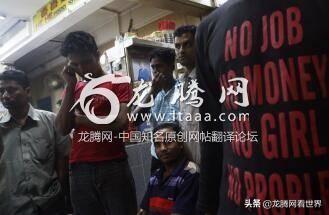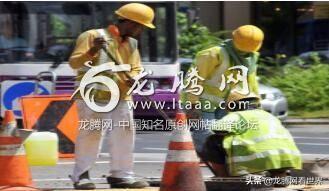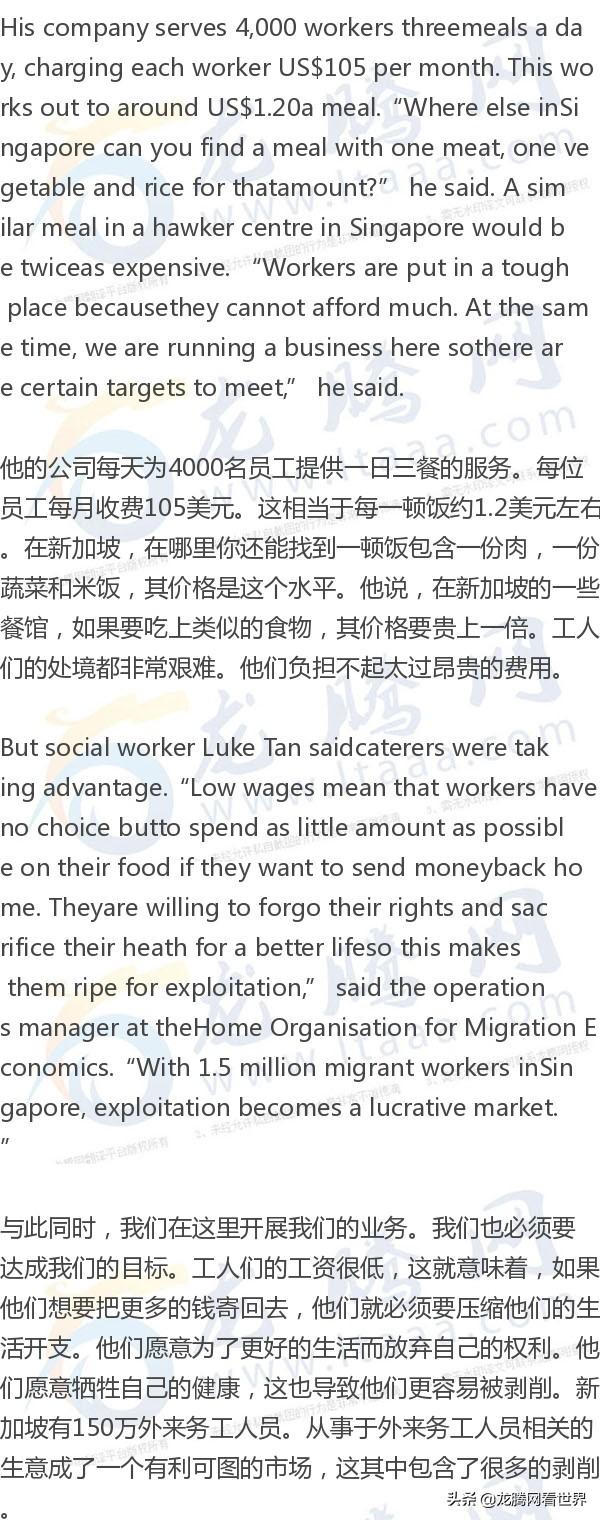Labourers from Bangladesh at a coffeeshop in Singapore’s Little India district. Photo: Reuters
上圖:工人來自孟加拉國,他們住在新加坡的小印度區,他們在一家咖啡店上班
Whenever Mominul Hassan calls his wifeand two children back home in Bangladesh, he makes it a point to disable thevideo call function on his phone so that they will not be able to see him.This,he says, is the only way to ensure that they never find out how much weight hehas lost since coming to work in Singapore as a construction worker eight yearsago. “If my wife sees me, she will worry and ask me to come home. I misshome but I also need to earn enough money before I can return,” he said.Hassan,32, weighed 65kg when he arrived here. Today, he is only 55kg – a dip caused bya lack of proper food and nutrition, he said.Hassan is not alone. In one ofAsia’s most developed countries, where food wastage is a national problem,migrant workers are going hungry because of low wages and a highly competitivefood catering industry that capitalises on the willingness of workers to scrimpand save for a better life.
每當摩尼納爾.哈桑給他孟加拉國的妻子打電話的時候,他都會關掉手機上的視頻通話功能。如此一來,他的妻子和他的孩子們便看不到他了。按照他自己的說法。他之所以要這樣做,是不希望讓他的家人們知道他在新加坡當建築工人的狀況。自從他來到新加坡當建築工人,他的體重已經減少了很多。他對我們說,“如果我的妻子看到我現在的樣子的話,她一定會擔心的。然後他會讓我回家。”他對我們說他很想回家,但是他希望那是在他賺了足夠多的錢以後。哈桑現在已經32歲了,他來到新加坡的時候,體重是65公斤。現在,他的體重只有55公斤。這主要是因爲當地缺乏合適的飲食,這造成他營養水平下降。哈桑絕對不是個例。新加坡是亞洲最發達的國家之一。新加坡食品浪費是一個全國性的問題。但是,很多工人在新加坡卻正在挨餓。這主要是因爲工資很低,餐飲業競爭激烈。很多工人節衣縮食,他們想要爲了更好的生活去存儲一些錢財。他們的這一意願非常強烈,餐飲業充分的利用了這一點。
LOW WAGES, FEW OPTIONS
World renowned for its meticulousplanning and distinct skyline that featured in the Hollywood hit film CrazyRich Asians, Singapore depends on a large pool of blue collar migrant workersfrom countries like India, Bangladesh and Myanmar to power its building andconstruction sector, which was valued at nearly US$22.5 billion in 2018.
新加坡有著亞洲非常獨特的天際線。在好萊塢的大片當中,出現了很多富裕而瘋狂的亞洲富人。但是,新加坡的富裕卻是由很多藍領工人所支撐起來的。這些工人主要來自于印度,緬甸和孟加拉國。這些工人主要從事建築方面的工作。在2018年,他們在新加坡創造了225億美元的産值。
But ina country with no minimum wage, migrant workers take home just US$13-15 dailyfor back breaking work that usually lasts from 10 to 12 hours a day, dependingon the scale of the project.As a result, most workers do not mind clocking inextra overtime hours to supplement their income. With barely enough time and cash tospare, they turn to caterers as a no-frills and cheap solution for their dailymeals.On paper, it seems a good deal. For US$90-US$110 a month, they get threemeals a day delivered straight to their dormitories and work sites.
但是新加坡是一個沒有最低工資標准的國家。那些外來務工人員每天只能掙13到15美元。他們每天要工作10到12個小時,這些工作都是非常繁重的體力勞動。具體勞動強度要取決于項目建設的規模。很多工人並不介意通過加班來增加他們的收入水平,工人沒有足夠的時間和金錢來改善他們的飲食。所以他們只能求助于那些餐飲公司。這些廉價的餐飲公司,爲他們提供廉價的日常膳食。從表面上來看,這似乎是一個非常平等的買賣。他們每個月支付90美元到110美元。如此一來,他們就能夠得到一日三餐的服務。這些飲食會定時定點的送到他們的工作地點。
Exposed to Singapore’s heat andhumidity, the food often succumbs quickly in the open.“The food always arrives fresh butby the time I eat it, it has already become bad. Usually I will throw awayabout half of the rice because I cannot eat it any more,” said Hassan.
Ironically, the workers are alsocontributing to Singapore’s food waste problem.
LACK OF STORAGE
The food packages are usually left inboxes in the open, because there is a lack of proper food storage areas neardormitories and work sites.As a result, workers told This Week in Asia it isnot uncommon to find stray dogs and rats getting to the food packets beforethem. Duringmonths of monsoon rain, the food is soaked and inedible.To get by, workersoften forgo meals altogether. Others turn to caffeine-enhanced energy drinks toperk themselves up and to eliminate hunger pangs.Indian national A. Rajah, whohas lived in Singapore for seven years, says that even though he is well awareof the long-term side effects of energy drinks, such as increased bloodpressure and diabetes, he has little choice. “It’s cheap and the sweetaftertaste helps to keep me awake,” he said. “But I’m not the only one. If youwait outside worker dormitories in the morning, you will see piles of energydrink cans.” For workers who live in dormitories equipped withadequate cooking facilities, the situation is only slightly better. While theycan cook their own meals, the supermarkets in dormitories usually charge higherprices for their goods compared to those elsewhere.
那些食物暴露在新加坡濕熱的環境當中,食物很快就會變質。哈桑說,食物剛開始的時候是新鮮的,但是,當我們開始去吃的時候,很多已經變馊變壞了。所以,通常我們都會扔掉一半的食物。因爲我們再也吃不下那些已經變馊變壞的食物。具有諷刺意味的是,這些工人助長了新加坡食品浪費問題。因爲食品包裝缺乏,導致很多食物暴露在空氣當中,沒有合適的場所來存儲這些食物。當地的工作人員告訴我們,在很多時候,當地的流浪狗和老鼠會搶在工人之前去吃那些食物。這種狀況並不罕見。在新加坡的雨季裏面,通常會持續幾個月的時間。那些食物通常都會被浸泡過,導致食物無法被食用。爲了維持生計,工人們通常都會餓著肚子,他們會選擇不吃飯。另外一些人會喝含咖啡因的飲料來提神。他們希望通過這種方式來消除他們的饑餓感。拉賈在新加坡生活了七年,他是一名印度人,他說他非常清楚那些能量飲料的副作用,那些飲料會導致血壓升高,而且會導致糖尿病,但是他別無選擇。這些能量飲料很便宜,而且非常美味。這些飲料的味道讓我保持清醒。他告訴我們,他並不是唯一一個這樣做的人。如果你早上在工地門口站著去觀察的話,你會看到成堆的飲料罐。有些宿舍裏面會配備一些烹饪設備,在這些地方,情況可能會略有好轉。他們可以自己做飯,但是,與其他地方相比,那些宿舍裏面的超市通常都會對商品收取很高的價格。
“The nearest supermarket is veryfar away and by the time we all get back at the end of the day, we are all verytired,” said R. Velmurugan, from India.“Every minutethat we get to rest is important so we have no choice but to buy from thesupermarket in the dorm even though it is expensive.”
CATERERS struggle, too
最近的超市離我們很遠。等我們下班回來的時候我們都已經很累了。威爾莫.魯根說,每一分鍾的休息時間對于我們來講都非常重要。我們別無選擇,所以我們只能在超市裏面買東西。盡管那些東西都很貴,我們依然不得不如此。
餐飲業激烈的競爭:
With 1.5 million foreign workers inSingapore, the food catering business that serves them is lucrative. To edgeahead, firms slash prices knowing the customers are very price sensitive.Quality invariably suffers.“Similar to any other industry, the more you pay, the better thequality. It is not the fault of the caterers or the workers,” said SukkurMaideen, 47, who manages a canteen and a supermarket at a dormitory. Caterersdo not have it easy either. To meet demand, kitchen operations run 24 hours aday, every day of the year. The labour intensive business chalks up heavy costsfor logistics, fuel and manpower and Singapore is expensive. Margins are thin.
有150萬外國工人在新加坡工作,新加坡當地的餐飲業服務這些外國勞工,這明顯是有利可圖的事情。爲了搶占先機,很多公司會選擇降低價格。他們知道客戶對于産品的價格是非常敏感的。質量當然也會是其中的一個因素,和任何行業一樣,如果你想要更高的質量的話,你必須要支付更高的價格。蘇庫爾.麥迪恩在宿舍裏面管理著一家餐廳和一家超市。餐飲公司的日子也不太好過。爲了滿足人們的需求,廚房每天24小時都在營業。這是一個勞動密集型的企業,無論在物流,燃料和人力成本方面,其支出都是非常高昂的。
A seasoned industry player sayscaterers make just 30 cents per meal. To boost profits, corners are cut byusing inferior ingredients and consolidating deliveries.
One caterer said workers could notexpect more for the amount they paid.
但是利潤卻非常微薄,據經驗豐富的業內人士表示,餐飲公司每頓飯大概只賺30美分。爲了能夠提高他們的利潤,他們通常都會使用劣質的原料。他們還會采用整合配送的方式來偷工減料。一位宴會承辦商表示。員工們對于他們所支付的費用並沒有太高的期待。
Migrant worker T. Kamalakannan, 26,suggested using weatherproof thermal food boxes could improve the situation.“Proper storage boxes that can helpto keep our food warm and safe will give us peace of mind because we can workknowing that we don’t have to go hungry or throw away our food afterwards,” hesaid. Thefood issue, said migrant worker activist Debbie Fordyce, executive committeemember at Transient Workers Count Too, was part of a wider picture ofexploitation facing low wage transient migrant workers. After having to payexorbitant recruitment fees to secure their – often dangerous and demeaning –jobs, workers were indebted to a point where coercion and exploitation wasinevitable, said Fordyce. She said employers had a responsibility to ensuretheir workers had access to reliable caterers or adequate kitchen facilities toprepare their own meals. “Migrant workers play a key role in driving oureconomy. We should treat foreign workers humanely, not as disposable andreplaceable labour,” she said.
卡馬拉卡南是一名外來務工人員,他建議,應該使用防風雨的保溫食品盒來改善這種狀況。他說,適當的保障措施可以來改善食物的存儲品質,這將會讓我們更加安心。因爲,如此一來的話,我們在工作的時候就可以明確的知道,在工作完成之後,我們將不會餓著肚子。我們也不必把食物給扔掉。從事移民維權人士黛比.福黛斯表示,糧食問題只是其中的一個問題,工人們面臨著廣泛的剝削。他們的很多工作通常都是危險而有損人格的,他們還不得不支付高昂的招聘費用,他們的選擇已經變得非常有限。她說,雇主有責任確保他的員工們能夠吃上健康的食物。外籍勞工推動了新加坡的經濟發展,在這個過程當中,他們起到了非常重要的作用。新加坡應該要以人道的態度來對待這些工人。而不應該僅僅把他們看成是一次性的,可替代的勞動力來使用。
評論翻譯
原創翻譯:龍騰網 http://www.ltaaa.com 轉載請注明出處
1. dpaau@******
It is necessary to report on abuse onANY people but calling modern cities in Asia “hell” for domesticworkers insults both local employers and the many aspiring helpers coming in.Unless you can provde something better to replace it, do not badmouth this typeof employment which, naturally, should be under constant monitoring.If youreally want to see hell, go to the “red light” districts. Try 42ndStreet in New York City.
任何一個這樣的狀況都應該被披露出來。但是把那些亞洲發達的城市當成是“地獄”, 這不僅是對于當地的那些雇主的侮辱,也是對那些來尋找工作的人的侮辱。除非你能夠找到一些更好的替代的工作,否則你又能有什麽樣的辦法呢?當然,在這些地方工作應該受到持續的監控。如果你真的想要了解“地獄”的話,那你就去“紅燈區”,去看看紐約的第42街區吧。
2. Stephen_Lam
Domestic helper are not Citizen, theyare on work visa, and they have be fits of free lodging and free food. Withhousing and food cost being taken care of their disposable salary is higherthan a lot of Hong Kongers.It is difficult or close to impossible that a HongKonger earn 20k a month to support their families and own a property but theseworkers are able to. So their wages in absolute term is more than decent. Thereare bad employers but this does not means all employer are, same as there arecriminals but it does not means everyone is a criminals.End of the day,domestic workers in Hong Kong have a higher wages than the same work in a lotof countries. And they are in Hong Kong because they want the job not becausesomeone force them into it.
那些工人並不是本國的公民。他們持有工作簽證,他們享受免費的住宿和免費的食物,由于他們的食宿都能夠得到保障。他們的很多可支配收入比很多香港本地人都高。一個香港人每月掙兩萬港幣來養活他的家庭,他想要擁有房産是非常困難的。甚至可以說是完全不可能的。但是這些工人可以做得到。因此,從絕對工資水平上來講,他們的待遇還是不錯的。當然也有一些不好的雇主。但是,這並不意味著所有的固執都是很壞的。任何地方都會有一些犯罪的情況。當然,這並不意味著每一個人都是罪犯。總的來說,香港家政工作人員的薪資比很多國家的家政人員的工資都要高。他們之所以來到香港,是因爲他們想要這份工作。並沒有人強迫他們一定要這樣做。
4. waidolce2@******
Until the culture that considers somepeople are inferior changes, nothing will change. Or the government can enforcestiff penalties for these abusers.
除非那些歧視的文化發生改變。否則局面不會有什麽變化。或者政府能夠對那些施虐者采取一些嚴厲的措施。
5. randomNPC69
same recycled article from the samepseudo “journalist” again, why even point fingers at trash tier HKersand Singaporeans? in Philippines and indonesia it’s far worse in general wherethey would be oppressed by their own countrymen.I can only imagine how vilePH/ID employers are towards cheap unskilled employees.if it’s so bad abroad whydon’t they return home? the answer is – because bad here is still 100x betterthan life in those SEA countries.
同樣來自于那些無良記者的文章,爲什麽還要指責香港和新加坡。在菲律賓和印度尼西亞,情況要糟糕得多。他們會受到本國同胞的壓迫。如果香港和新加坡真的這麽糟糕的話,爲什麽這些人不選擇回家呢?答案就是,即使這種糟糕的生活也比那些東南亞的島國要好上100倍。




